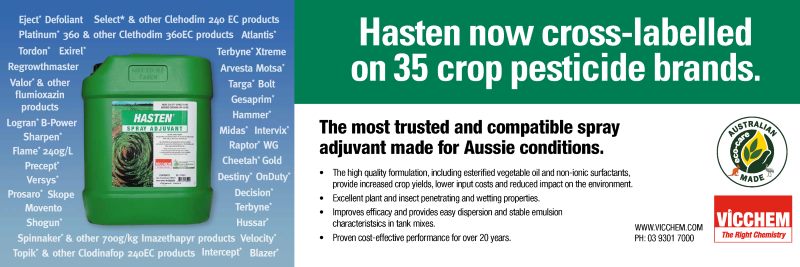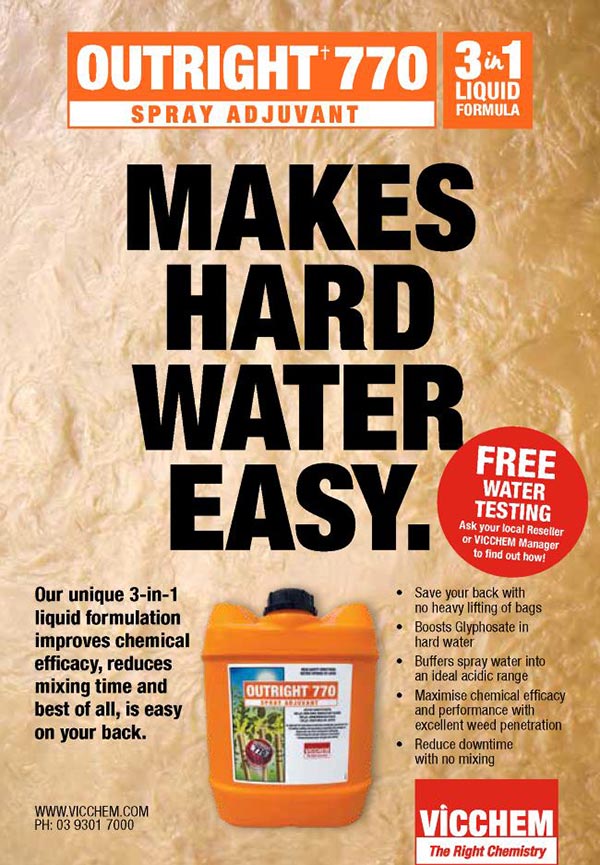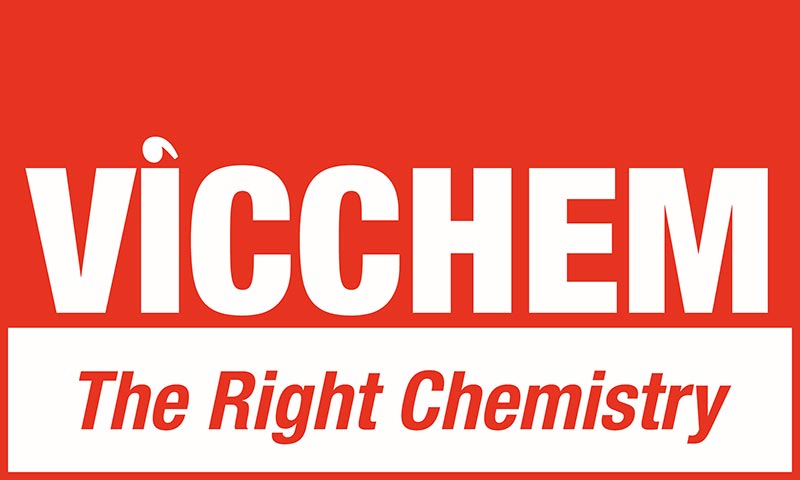For robust results from summer knockdown herbicides – namely glyphosate – resellers and agronomists should ensure farmer clients choose the right chemistry for the water hardness.
That’s the advice of Peter Jones, technical services manager with Australia’s own Vicchem, a leading R&D based manufacturer which has developed a range of unique 3-in-1 spray adjuvants for summer knockdown weed control.
“Trials show Hot-Up is ideal when using soft to moderate water such as town and most channel water - typically less than 300 ppm of hard water ions,” said Mr Jones.
“Being oil-based, Hot-Up prevents droplet breakdown in the hot and dry conditions of Australian summers.
“For moderate to hard water from dams, open channels and bores - up to 750 ppm - we recommend new spray adjuvant Outright 770, which delivers better adhesion and spread of glyphosate as well as water conditioning.
“For very hard bore water or channel water - harder than 750 ppm - glyphosate works best when tank mixed with Infiltrator and Assert,” he said.
Director of Vicchem’s adjuvant research program for more than 10 years, Mr Jones said hard water often contained calcium or magnesium ions which could interact with glyphosate to form insoluble complexes, rendering it inactive.
“However, hard water can be managed with Vicchem’s summer adjuvant range because the ammonium sulphate in Hot-Up, Outright 770 and Assert prevents this interaction, instead forming glyphosate-ammonium which is readily dissolved and absorbed.”
Mr Jones said the main source of hard water ions came from limestone leaching which was common in Australian aquifers. Zinc and iron could also influence water hardness but were less common.
“Many commercial laboratories offer water testing services which can quantify the range of minerals in a water sample,” he said.
“Simple DIY test kits are also available which can provide a useful guide to water hardness within a few seconds.
“Hard water can also affect the function of surfactants, leading to problems such as poor wetting, flocculation and nozzle blockage.
“However, these problems are largely avoided if the right adjuvant chemistry is chosen for the level of water hardness,” he said.
Mr Jones said Vicchem would launch a campaign in rural Australia next month to promote its summer adjuvant range and the latest research on managing hard water.
For more details, contact Peter Jones or Owen Connelly at Vicchem’s Coolaroo headquarters on (03) 9301 7000.
For robust results from summer knockdown herbicides – namely glyphosate – resellers and agronomists should ensure farmer clients choose the right chemistry for the water hardness.
That’s the advice of Peter Jones, technical services manager with Australia’s own Vicchem, a leading R&D based manufacturer which has developed a range of unique 3-in-1 spray adjuvants for summer knockdown weed control.
“Trials show Hot-Up is ideal when using soft to moderate water such as town and most channel water - typically less than 300 ppm of hard water ions,” said Mr Jones.
“Being oil-based, Hot-Up prevents droplet breakdown in the hot and dry conditions of Australian summers.
“For moderate to hard water from dams, open channels and bores - up to 750 ppm - we recommend new spray adjuvant Outright 770, which delivers better adhesion and spread of glyphosate as well as water conditioning.
“For very hard bore water or channel water - harder than 750 ppm - glyphosate works best when tank mixed with Infiltrator and Assert,” he said.
Director of Vicchem’s adjuvant research program for more than 10 years, Mr Jones said hard water often contained calcium or magnesium ions which could interact with glyphosate to form insoluble complexes, rendering it inactive.
“However, hard water can be managed with Vicchem’s summer adjuvant range because the ammonium sulphate in Hot-Up, Outright 770 and Assert prevents this interaction, instead forming glyphosate-ammonium which is readily dissolved and absorbed.”
Mr Jones said the main source of hard water ions came from limestone leaching which was common in Australian aquifers. Zinc and iron could also influence water hardness but were less common.
“Many commercial laboratories offer water testing services which can quantify the range of minerals in a water sample,” he said.
“Simple DIY test kits are also available which can provide a useful guide to water hardness within a few seconds.
“Hard water can also affect the function of surfactants, leading to problems such as poor wetting, flocculation and nozzle blockage.
“However, these problems are largely avoided if the right adjuvant chemistry is chosen for the level of water hardness,” he said.
Mr Jones said Vicchem would launch a campaign in rural Australia next month to promote its summer adjuvant range and the latest research on managing hard water.
For more details, contact Peter Jones or Owen Connelly at Vicchem’s Coolaroo headquarters on (03) 9301 7000.
Vicchem Latest News

Hasten increases cross-labelled registered products to 35
Since its Australian launch in 1994, Hasten has been cross-labelled on 35 leading agricultural chemical products, with recent additions including the insecticides Adama’s Skope, Bayer’s Movento and BASF’s Versys. Hasten’s foliar penetrative properties make it the adjuvant of choice for these new systemic insecticides.

Outright 770 - Makes Hard Water Easy
Our unique 3-in-1 liquid formulation improves chemical efficacy, reduces mixing time and best of all, is easy on your back.
READ MORE

